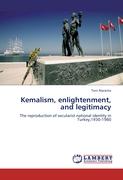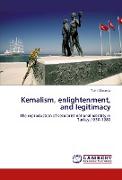Kemalism, enlightenment, and legitimacy
BücherAngebote / Angebote:
This study analyses the attempt to build political legitimacy in the Republic of Turkey from the 1930s to 1980s. This is done by exploring the texts produced by Kemalist writers who reproduced a European-originated enlightenment meta-narrative in order to legitimize the existence of Kemalist state-ideology. Central in this process was a hegemonic representation of history, namely, the interpretation of the Anatolian Resistance Struggle of 1919-1922 as a Turkish revolution executing the enlightenment in the Turkish nation-state. The study first demonstrates the way in which the fundamental presuppositions of this enduring narrative were initially produced in the famous Six-Day speech (Nutuk) of Mustafa Kemal Ataürk, the founder and first president of the republic, and then proceeds to uncover how this narrative was reproduced, with minor variations, in different historical contexts during the period concerned. The study demonstrates that the Kemalist enlightenment meta-narrative created a group of narrative accruals which enabled generations of secular middle classes to internalize Kemalist ideology.
Folgt in ca. 10 Arbeitstagen




